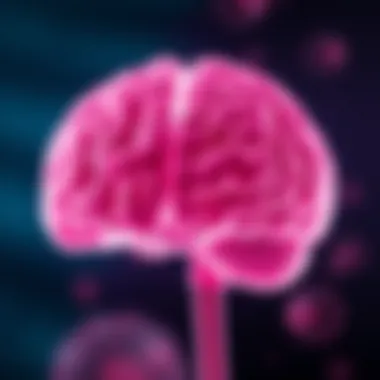Understanding the Causes of Erectile Dysfunction


Intro
Erectile dysfunction (ED) is not just a personal concern; it reflects a broader tapestry of health issues that intertwine physical well-being with psychological and lifestyle factors. The inability to achieve or maintain an erection can have deep-rooted connections to a man's self-esteem, relationships, and overall quality of life. As an umbrella term for various conditions, ED is estimated to affect a substantial percentage of men, particularly as they age. However, it’s crucial to understand that age alone does not dictate the onset of ED. Instead, this condition is often the result of a complex interplay of factors that require not just awareness but also informed discourse.
In this exploration, we will uncover the multilayered etiology of erectile dysfunction, diving into the relevant methodologies that researchers employ to unravel its complexities. As we dissect these approaches, we will shed light on how psychological, physiological, and lifestyle influences converge to cause this pervasive condition. This comprehensive overview aims not only to enlighten but also to serve as a foundation for future research and therapeutic strategies. By linking theoretical implications with practical insights, the narrative seeks to enhance understanding among students, researchers, educators, and medical professionals dedicated to men's health.
Through rigorous analysis and thoughtful examination, we will pave a path towards a clearer comprehension of erectile dysfunction, empowering our readers to engage more meaningfully with this crucial topic.
Understanding Erectile Dysfunction
Erectile dysfunction (ED) is a condition that affects many men worldwide, yet it remains a topic often shrouded in stigma and misunderstanding. Grasping the complexities of ED is crucial, not only for those experiencing it but also for healthcare providers, researchers, and society as a whole. Addressing erectile dysfunction involves more than just focusing on physical symptoms; it necessitates an understanding of the psychological, physiological, and environmental interplay that contributes to this condition.
In exploring ED, one can appreciate the need for a multidimensional approach. This want engages various aspects ranging from emotional health to dietary influences, allowing for a more holistic understanding. Gaining insight into the various layers from clinical presentations to the demographic spread lends depth to our awareness and combats misconceptions surrounding male sexual health issues.
Ultimately, understanding erectile dysfunction equips men with the knowledge to seek appropriate help and fosters a dialogue that can lead to improved health outcomes.
Definition and Clinical Presentation
Erectile dysfunction is clinically defined as the persistent inability to achieve or maintain an erection sufficient for satisfactory sexual performance. It is not merely a common inconvenience but can be indicative of underlying health issues. Men might experience ED temporarily due to stress or fatigue. However, when this problem becomes recurrent—lasting for more than a few weeks—it may signify deeper psychological or physiological concerns.
Clinically, the presentation of ED varies widely. Some men might find it difficult to achieve any erection at all, while others experience inconsistent erectile function. Over time, the psychological impact of this condition can lead to anxiety, further exacerbating the problem.
"Erectile dysfunction is often a reflection of a man's overall health; it can signal issues within the cardiovascular system or psychological realm."
Recognizing these symptoms is the first crucial step towards tackling the root causes.
Prevalence and Demographics
The prevalence of erectile dysfunction increases with age, yet it is not solely a condition of older men. Studies suggest that approximately 30 million men are affected by ED in the United States, with variances observed across different age groups. Here are some points to consider:
- Around 40% of men experience some degree of ED by the age of 40.
- The likelihood of developing ED can rise to nearly 70% among men in their seventies.
- Moreover, lifestyle, comorbidities, and psychological states also play significant roles across different demographics.
Interestingly, recent research indicates that younger men are experiencing ED at higher rates, possibly influenced by stress, mental health issues, or lifestyle factors such as substance abuse or a sedentary lifestyle. This trend highlights the necessity for education and preventive strategies tailored for a broader age range.
In summary, awareness of the prevalence and demographic components of erectile dysfunction is essential in addressing and demystifying this condition, enabling men everywhere to seek the support they need.
Psychological Factors in Erectile Dysfunction
Understanding the psychological contributors to erectile dysfunction is crucial for both diagnosis and treatment. This segment dives into how mental and emotional well-being can significantly affect a man's ability to maintain an erection. Beyond mere statistics, we shine a light on the individual stories and lived experiences that lead to this condition. Tackling these aspects not only aids in grasping the multifaceted nature of ED but also offers pathways for effective treatment.
Emotional and Mental Health
Emotional health and mental stability are cornerstones of healthy sexual function. In fact, they play a pivotal role in erectile dysfunction. A man's self-esteem, body image, and emotional state can all influence how they experience intimacy. In many cases, negative self-perception can spiral downwards, feeding into a cycle of failure and anxiety that exacerbates ED.
For instance, a study may reveal that men grappling with low self-worth often feel less confident in their sexual abilities, which can lead to performance anxiety. This anxiety often amplifies their fears, creating a feedback loop that makes achieving or maintaining an erection even more difficult. Recognizing these underlying emotional issues can allow for more tailored therapeutic approaches, aiming to improve not just the physiological aspects of ED but also providing counseling for emotional support.
Stress and Anxiety’s Role
Stress, often described as the silent killer, can wreak havoc not only on one's general health but also on sexual performance. When stress levels rise, the body enters a fight-or-flight mode, releasing hormones like adrenaline and cortisol. These hormones are great for survival but not so much for sexual arousal. The focus shifts away from intimate connection to mere survival, trailing off into the distance of anxiety and distraction.
Moreover, the pressure placed on an individual to perform can magnify the effects of anxiety on sexual function. Whether it’s work-related stresses, relationship issues, or financial worries, these factors can become overwhelming. It's imperative to address such worries not only through relaxation techniques but also by fostering open communication with partners, which can serve as a crucial step towards rekindling that intimate spark.
"When mental hurdles are transcended, physical barriers often turn out far less rigid."
Depression and ED Correlation
There exists a strong correlation between depression and erectile dysfunction. Research indicates that up to 30% of men with depression report experiencing ED. The relationship between these two conditions is often a two-way street—depression can lead to difficulties in sexual function, and the resultant ED can further intensify feelings of inadequacy and despair.
Clinical observations suggest that men suffering from chronic depression may lose interest in sex, not due to a lack of desire but rather as an outcome of the emotional and biological changes wrought by depression. Medications prescribed for depression, while helpful for managing symptoms, often have side effects that inadvertently contribute to ED. This conundrum underscores the need for integrated treatment approaches. A mental health professional may need to collaborate with a urologist to ensure that all angles are being addressed, thus promoting holistic healing and recovery.
In sum, recognizing the psychological factors that influence erectile dysfunction enables a more nuanced understanding of this complex condition. Each emotional thread is interconnected, weaving a rich tapestry that informs potential treatment strategies and paths forward. By combining psychological insights with physiological assessments, a more comprehensive approach to erectile dysfunction can emerge.
Physiological Contributors to Erectile Dysfunction


Understanding the physiological contributors to erectile dysfunction (ED) is essential as it opens the door to identifying the root causes and potential treatments for this complex condition. The interplay of various bodily systems can greatly impact a man's ability to achieve and maintain an erection. Therefore, recognizing these physiological factors is crucial not only for healthcare professionals but also for patients seeking clarity around their experiences and treatment options.
Hormonal Imbalances
Hormonal health plays a pivotal role in sexual function, and imbalances can disrupt the intricate processes that lead to erections. Testosterone is the primary male sex hormone, and its levels naturally decline with age. However, low testosterone levels can lead to a range of symptoms, including decreased libido, fatigue, and erectile dysfunction.
Moreover, hormonal issues aren’t limited to testosterone alone. Imbalances in thyroid hormones can also impact sexual function. For example, an underactive thyroid can lead to lethargy and weight gain, indirectly leading to erectile dysfunction.
A comprehensive assessment of hormone levels through blood tests is essential to identify such issues. Treatments may range from hormone replacement therapy to lifestyle modifications aimed at natural optimization of hormone levels.
Cardiovascular Health
Cardiovascular health is intimately linked to erectile function. The process of achieving an erection relies on a delicate balance of blood flow, which in turn is controlled by the arterial and venous systems. Conditions such as atherosclerosis, hypertension, and heart disease can hinder blood flow to the penis, causing difficulties in achieving an erection.
Several studies indicate that men with erectile dysfunction are likely to face cardiovascular issues. It can serve as an early warning sign for more significant heart problems down the line. Therefore, screening for cardiovascular diseases in men experiencing ED is key to addressing both concerns.
Effective management of cardiovascular health through diet changes, exercise, and medication if necessary can also lead to improvements in erectile function.
Neurological Conditions
The nervous system is crucial in facilitating erections, signaling from the brain down to the genital region. Thus, neurological conditions can directly impair sexual function. Conditions such as multiple sclerosis, Parkinson's disease, or spinal cord injuries can disrupt the necessary nerve pathways.
Furthermore, even benign conditions like pelvic surgeries can lead to nerve damage, subsequently causing erectile issues. Neurological assessments are important for identifying and managing these complex interactions. Treatment options often delve into a multidisciplinary approach, bringing together urologists, neurologists, and even psychologists, to create a tailored management plan.
Metabolic Disorders
Metabolic disorders include a range of conditions that can affect bodily functions, with diabetes being particularly renowned for its association with erectile dysfunction.
Men with diabetes often experience nerve damage, known as diabetic neuropathy, which can influence sexual health profoundly. It is estimated that around 50% of men with diabetes will face erectile difficulties at some point in their lives.
Regulating blood sugar levels, following a proper diet, and adequate physical activity are fundamental strategies for managing the implications of metabolic disorders on sexual function. Regular monitoring through health check-ups can also help alleviate some risks.
Lifestyle and Environmental Influences
Understanding the role of lifestyle and environmental influences is pivotal when discussing the etiology of erectile dysfunction (ED). An increasing body of evidence suggests that these factors not only contribute significantly to the onset of ED but can also affect its progression. By dissecting various lifestyle choices and environmental conditions, we can gain insights into how they intertwine and impact men's sexual health.
Impact of Diet
Diet carries substantial influence over many aspects of health, including erectile function. A diet rich in fruits, vegetables, whole grains, and lean proteins supports cardiovascular health, which is essential for adequate blood flow - a key component of achieving and maintaining an erection. On the flip side, excessive intake of processed foods, sugars, and fats can lead to various health issues, including obesity and heart diseases, both of which are linked to ED.
Consider the Mediterranean diet, which includes a wealth of healthy fats from olives and fish along with ample vegetables. Research indicates that adherence to this diet can reduce the risk of erectile dysfunction. In contrast, high-caloric diets devoid of essential nutrients can hinder metabolic processes and contribute to sexual dysfunction.
A balanced diet can profoundly affect erectile function. Eating healthy foods can enhance blood flow and overall health, thus improving sexual well-being.
Sedentary Lifestyle Considerations
Today’s fast-paced world often leads individuals to adopt a more sedentary lifestyle, with prolonged periods of sitting becoming commonplace. Physical inactivity has a direct correlation with erectile dysfunction. Lack of exercise can result in weight gain, reduced stamina, and poor cardiovascular health, all of which can jeopardize sexual performance.
Engaging in regular physical activity not only aids in maintaining a healthy weight but also boosts testosterone levels, improves mood, and enhances blood circulation. Incorporating even simple exercises like walking or cycling into one’s daily routine can lead to noticeable improvements in erectile function.
It is essential to recognize the following points about a sedentary lifestyle:
- Negative health impacts: Increased risk of diabetes, obesity, and cardiovascular diseases.
- Mental health: Reduced physical activity often links with higher rates of depression and anxiety, which can further exacerbate ED issues.
- Exercise benefits: Regular activity promotes better blood flow and hormone balance, alleviating some causes of erectile dysfunction.
Substance Abuse and ED
Substance abuse, whether it involves alcohol, tobacco, or illicit drugs, poses significant risks to sexual health. Tobacco use is notably detrimental; it damages blood vessels and impairs blood circulation. This constriction can affect the ability to achieve an erection, directly linking smoking habits to prolonged instances of ED.
Alcohol, while often perceived as an aphrodisiac, can lead to complications if consumed heavily. While a glass of wine might set the mood, excessive drinking can blunt sexual responsiveness and contribute to performance anxiety.
Moreover, illicit drugs such as cocaine and heroin can wreak havoc on both physiological and psychological levels, further derailing normal erectile function. Over time, dependency on such substances may lead to ongoing health compromises, ultimately worsening ED.
To summarize the implications of substance abuse:


- Tobacco: Damages blood vessels, leading to reduced circulation.
- Alcohol: At low doses may help, but high consumption can lead to reduced sexual desire and capability.
- Drugs: Cause physiological disruptions and increase psychological distress.
Chronic Health Conditions and Erectile Dysfunction
Chronic health conditions play a pivotal role in the complexity of erectile dysfunction (ED). Understanding this relationship is crucial, not only for identifying potential causes of ED but also for formulating effective treatment strategies. The interplay between chronic diseases and erectile function is often underestimated. Many individuals may not recognize how their long-term health issues impact their sexual health. This section aims to shed light on the most prevalent chronic conditions linked to ED, emphasizing their implications and considerations for comprehensive care.
Diabetes and Its Implications
Diabetes is one of the foremost chronic conditions that can significantly impair erectile function. Men with diabetes—especially those with poorly managed blood sugar levels—often experience nerve damage and impaired blood flow, both of which are critical for achieving and maintaining an erection. The risk of developing ED is notably higher in men with diabetes compared to their non-diabetic counterparts.
- Pathophysiology: High glucose levels may lead to vascular complications, reducing blood flow to the penis. Nerve damage (known as diabetic neuropathy) can further compromise the signaling necessary for erection.
- Mutual Impacts: Additionally, the psychological burdens of diabetes, such as anxiety about sexual performance, can also contribute to ED. Treating diabetes effectively through lifestyle changes and proper medication can ameliorate erectile dysfunction in many cases.
Hypertension Effects
Hypertension, or high blood pressure, is another chronic condition commonly linked to erectile dysfunction. It affects the cardiovascular system, which is fundamental for sexual arousal and function. Men with hypertension are susceptible to ED due to various factors, including:
- Blood Vessel Damage: Constantly elevated blood pressure can damage blood vessels, making it harder for the body to achieve adequate penile blood flow.
- Medications: Many antihypertensive medications have side effects that contribute to erectile dysfunction, creating a dilemma for those managing high blood pressure.
"Managing blood pressure is not just about heart health; it's about the whole body, including sexual health."
It becomes essential for healthcare providers to adopt a holistic view when treating patients with hypertension, considering both blood pressure management and the associated risk of ED.
Peripheral Vascular Diseases
Peripheral vascular disease (PVD) is characterized by narrowed blood vessels that reduce blood flow to the limbs and organs, which includes the penis. It is particularly common in individuals with a history of smoking, diabetes, and hypertension. The reduced blood flow can lead to:
- Erectile Difficulties: As the blood vessels narrow and the circulation is compromised, men may encounter issues achieving or sustaining an erection.
- Comorbid Conditions: Many men with PVD also suffer from other conditions that lead to erectile dysfunction, making it critical to address the entire health spectrum.
Awareness and early treatment of peripheral vascular diseases could help mitigate the risk of erectile dysfunction in men. Men experiencing difficulty with erections should consider discussing their vascular health as part of their evaluation process. Rather than viewing ED in isolation, it’s vital to recognize that it may be a symptom of larger health issues.
Medications and Their Impact
Understanding how medications play a role in erectile dysfunction (ED) is an essential part of recognizing its multifaceted nature. Medicines prescribed for various health conditions can sometimes have unintended side effects, notably impacting sexual performance. As a growing concern in men’s health, it's vital to pinpoint which medications might be contributing to ED and how they interact with overall health. Knowing the specific connections can aid healthcare providers and patients in managing this condition effectively.
Common Medications Linked to ED
Many common medications have been identified as potential culprits for erectile dysfunction. Some of these include:
- Antihypertensives: Medications such as losartan and amlodipine, which are used to treat high blood pressure, can interfere with blood flow requirements necessary for achieving an erection.
- Antidepressants: Selective serotonin reuptake inhibitors (SSRIs) like sertraline and fluoxetine might lead to decreased libido and sexual dysfunction as side effects, though they are prescribed to manage mental health.
- Antipsychotics: Drugs like risperidone can impact dopamine levels which may diminish sexual interest.
- ** Benzodiazepines**: Medications for anxiety, like diazepam, can lead to diminished sexual arousal due to their sedative effects.
- Prostate Cancer Medications: Hormonal therapies, including flutamide, may also contribute to erectile difficulties.
Understanding these medications and their links to erectile dysfunction is critical in addressing potential issues. Not every individual will experience the same side effects, and some men may find that adjusting dosages or switching medications could alleviate the problem. Open and honest discussions with healthcare professionals can lead to better-tailored approaches in treatment.
Understanding Antidepressants and ED
Antidepressants, while lifesavers for many, often carry the heavy burden of side effects. One of the most significant side effects reported by men is erectile dysfunction.
SSRIs are particularly notorious for impacting sexual function. The mechanism behind this is somewhat complex: they increase serotonin levels in the brain, which can sometimes lower libido and interfere with the physiological processes required for an erection. The effects can be profound, with studies indicating that approximately 30-70% of men on these medications might experience some sexual dysfunction.
For individuals experiencing ED tied to antidepressants, there are several considerations:
- Medication Adjustment: Sometimes, healthcare providers can adjust the dosage or explore alternative antidepressants that might have fewer sexual side effects, such as bupropion, which is less likely to cause erectile dysfunction.
- Timing of Dosing: Taking the medication at a specific time may also help, as some users report better sexual functioning at certain intervals post-dosing.
- Counseling Options: Engaging in therapy or counseling might also help, as addressing underlying psychological factors could prove beneficial.
Important Note: Never adjust or stop your medication without discussing it with a healthcare provider. Understanding the balance between mental health and sexual function is vital for the well-being of many men.
The relationship between antidepressants and erectile dysfunction highlights a critical intersection within health management. The consequences of these medications offer a window into the broader narrative of how even well-intentioned treatments can lead to unforeseen challenges.
For further reading on the impact of medications on erectile dysfunction, you can find valuable resources through Wikipedia and Mayo Clinic.
Assessments and Diagnostic Approaches
When it comes to understanding erectile dysfunction (ED), assessments and diagnostic approaches are pivotal. These protocols not only aid in identifying the underlying causes but also help in charting a suitable course for treatment. Given the nature of ED, which can stem from a neighborhood of heterogeneous factors—ranging from psychological to physiological considerations—it becomes absolutely necessary for practitioners to adopt a comprehensive evaluation strategy.
Clinical Evaluations


In the realm of clinical evaluations, the first step usually involves a thorough medical history. This is where the clinician seeks to gather a wealth of information from the patient, encompassing anything from general health status to sexual history, including any related symptoms.
Common questions include:
- Have you had this issue before, or is it a new occurrence?
- Are there any medications that you are currently taking?
- What lifestyle factors might be playing a role?
Physical examinations follow suit, where healthcare professionals assess vascular health and the condition of the genitalia. Blood flow, hormone levels, and nerve function may all be examined to unearth possible causes of dysfunction. It’s almost like peeling layers off an onion, where each layer brings new insights that guide further testing.
Psychological Assessments
While physiological evaluations are undeniably important, psychological factors can weigh heavily on erectile function. That's why psychological assessments aren't just an afterthought; they're integral in understanding the full scope of a patient's condition.
Psychologists or psychiatrists may look into both emotional well-being and mental health history. Questionnaires designed to gauge anxiety, stress levels, and underlying depression are common tools. Graphical scales and structured interviews allow for nuanced insights that might not surface in a casual chat. Aspects like performance anxiety, relationship issues, or past trauma can play a significant role in erectile dysfunction. Early identification of these factors might pave the way to targeted therapies such as counseling or couples' therapy.
Blood Tests and Imaging Techniques
Beyond the obvious, blood tests and imaging techniques fill in the gaps in information gathered from history and evaluation. These tests assess hormone levels—such as testosterone and thyroid hormones—while simultaneously checking for diabetes and cholesterol levels which might contribute to vascular health. It’s like having a sneak peek into the inner workings of the body.
Furthermore, imaging techniques, like ultrasound, may be employed to look at blood flow dynamics within the penis, pinpointing areas where vascular deterioration might be occurring. This level of scrutiny ensures a tailor-made treatment plan can be established, addressing not only symptoms but root causes.
"Understanding the multifaceted nature of erectile dysfunction requires a systematic approach, as effective treatment hinges on comprehensive assessments and careful diagnostics."
Emerging Research and Future Directions
As we continue to make headway in the understanding of erectile dysfunction (ED), it's critical to highlight ongoing research and future explorations within this field. The complexity of ED requires a multi-faceted approach that encompasses biochemical, psychological, and social dimensions. Remaining abreast of emerging research offers not only fresh insights for practitioners but also signifies hope for individuals grappling with this sensitive issue.
The rising prevalence of ED calls for innovative strategies and therapies. This section will delve into the latest studies that provide a clearer picture of the etiology of ED, as well as pioneering therapeutic approaches that aim to enhance the quality of life for those affected.
Ongoing Studies on ED
Current research on erectile dysfunction is varied, focusing on several key areas. One notable line of inquiry centers around the role of gut health and its relationship with erectile functionality. Recent studies have suggested that certain gut microbiota may influence the development of ED through their effects on inflammation and vascular health. Indeed, scientists are exploring the connection between diet, gut microbiota, and erectile function in hopes of identifying preventive measures or treatments.
Additionally, there is a growing interest in the psychosocial aspects of ED. This research aims to explore how social support and relationship dynamics can impact erectile health. Understanding these relationships might not only contribute to better treatment protocols but also foster a holistic approach to men's health.
"Continued research and a multipronged approach are key to unraveling the complexities of erectile dysfunction."
Moreover, genetic studies are examining the heritability of ED, proposing that certain genetic markers may predispose individuals to this condition. Identifying these markers could pave the way for preventive strategies and tailored interventions. The exploration of neurobiological mechanisms, particularly the role of neurotransmitters and their respective pathways in erectile function, also remains a hot topic in current studies.
Innovative Therapeutic Approaches
As scientific inquiry progresses, several promising therapeutic approaches have emerged to combat erectile dysfunction. One such avenue is the development of newer phosphodiesterase type 5 inhibitors, which are already a cornerstone in ED management. Researchers are actively working on formulations that minimize side effects while enhancing efficacy.
Another innovative technique gaining traction is the use of low-intensity shockwave therapy. This approach has shown potential in promoting vascular regeneration and enhancing blood flow to the penis, addressing one of the primary physiological contributors to ED. In clinical studies, patients have reported significant improvements in erectile function after undergoing this therapy.
Furthermore, regenerative medicine, including the use of stem cells, is another frontier being explored. Stem cell therapy holds promise in repairing and rejuvenating erectile tissue, potentially offering a long-term solution rather than merely symptomatic relief. This could signify a paradigm shift in how ED is treated in the coming years.
Lastly, mind-body interventions, such as cognitive behavioral therapy, are being recognized for their efficacy in addressing the psychological dimensions of ED. These therapies are designed to tackle stress, anxiety, and negative self-image, which often exacerbate the condition. Integrating these approaches into a comprehensive treatment plan could yield notably positive outcomes for patients.
In summary, ongoing studies and innovative therapeutic strategies signify a rapidly evolving landscape in the treatment of erectile dysfunction. Such advancements not only promise to enhance therapeutic outcomes but also underscore the importance of a biopsychosocial approach in navigating ED. Future research will undoubtedly continue to unravel the intricate threads of this condition, fostering a more nuanced understanding that can ultimately improve the quality of life for many.
Finale
Understanding the etiology of erectile dysfunction is crucial for various reasons. This condition touches upon multiple aspects of a man's life, from physical health to emotional well-being and relationship dynamics. The thorough examination provided in this article sheds light on how intertwined these factors are, encouraging a more holistic approach to treatment.
Summation of Key Points
In the previous sections, we dissected the many layers contributing to erectile dysfunction. Key points include:
- Psychological Factors: Conditions such as stress, anxiety, and depression can heavily impact sexual health.
- Physiological Contributors: Issues like hormonal imbalances and cardiovascular health need careful evaluation, as they are often the root causes of ED.
- Lifestyle Choices: Habits such as diet and physical activity can either contribute to or alleviate the symptoms of erectile dysfunction.
- Chronic Conditions: Diseases, including diabetes and hypertension, have significant implications on sexual function.
It is vital to note that erectile dysfunction isn't just about the inability to perform sexually; it can create a ripple effect, influencing self-esteem and relationships. Educating patients and practitioners about these multifaceted aspects is essential for effective management.
Implications for Future Studies
The need for more in-depth research on erectile dysfunction continues to grow. While we have a wealth of information, emerging areas deserve particular focus:
- Longitudinal Studies: Monitoring individuals over time can yield insights into the evolving nature of erectile dysfunction and its determinants.
- Genetic Factors: Exploring how genetics may influence susceptibility to ED could reveal new avenues for prevention and treatment.
- Integrative Approaches: Future research could benefit from combining medical, psychological, and lifestyle interventions, leading to more comprehensive treatment protocols.
A better understanding of these implications will not just enhance clinical practice but may also inform public health initiatives aimed at improving men’s overall health. As the conversation around sexual health continues to evolve, researchers, as well as health professionals, must stay ahead of the curve to address the complex aspects of erectile dysfunction optimally.
“The process of understanding erectile dysfunction demands a multi-dimensional view, integrating countless factors into the clinical conversation.”
For more detailed insights about men's health and medical research, visit Wikipedia, Britannica, or browse through various studies published on *.edu and *.gov websites.



